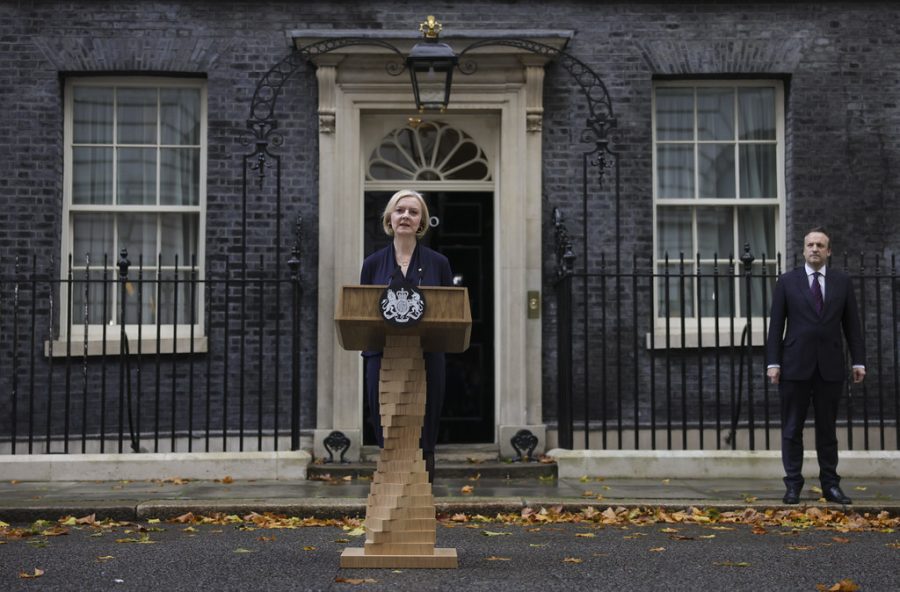Truss’ flawed economic policies were doomed from the start
Simon Dawson / No10 Downing Stre
Number 10 | Flickr
October 28, 2022
On Oct. 20, the Prime Minister of the United Kingdom Mary Elizabeth Truss, who goes by Liz Truss, resigned as the head of Parliament and the Conservative Party in Britain after a mere 44 days in office.
During her short tenure, Britain’s longest reigning monarch Queen Elizabeth II, passed away, a proposed fiscal budget crashed the U.K. stock market, the pound fell to its lowest value against the American dollar everand Truss scored the worst approval rating of any prime minister in history.
While many of the British citizens are happy to see her go, supporters of the ex-prime minister argue that Truss did the best with the situation thrust upon her. But Truss’ campaigning platform and policies would have led to her downfall even if she hadn’t inherited Boris Johnson’s mess.
The rise of Truss’s political ascension started with Boris Johnson’s resignation. After several scandals having to do with sexual assault and an inability to abide by COVID-19 regulations, Johnson stepped down from his position alongside two senior cabinet members.
Additionally, during his term as Prime Minister, Johnson pushed for and eventually succeeded in furthering the Brexit agenda, the withdrawal of the UK from the European Union.
By exiting from the EU, Britain hoped to diminish the influence of outside forces on British procedure and laws, gain more control over the division of British funds and increase Britain’s standing as a global leader.
It’s been nearly two years since Brexit and Britain’s economy is struggling tremendously.
Though all of Europe suffered the financial blows dealt by the pandemic, U.K. trade is recovering much more slowly than other countries in Europe and the Pacific region.
The per capita income of countries which are still part of the U.K. has grown by 8.5% in real terms, while Britain’s has grown by only 3.8%, according to the Organization for Economic Cooperation and Development.
Another unintended consequence of Brexit has been mass job vacancies.
European workers who could travel freely between Britain’s borders prior to Brexit have abandoned their British jobs in large numbers. During the pandemic, Britain lost over 400,000 people in its workforce.
In September, two months after Johnson’s resignation, Liz Truss was elected the leader of the Conservative Party and appointed Prime Minister by Queen Elizabeth II shortly before her death.
Liz Truss did not experience a promising start of term, with global inflation continuing to rise and a change in the monarchy just two days after her appointment.
As Prime Minister, Truss appointed Kwasi Kwarteng as the Chancellor of Exchequer, the equivalent of a finance minister.
Kwarteng presented The Growth Plan to the House of Commons on Sep. 23. The “mini” fiscal event included unfunded tax cuts of $45 billion for the wealthy, decreased funding for National Insurance and undid a bill that would have funded health care projects.
As predicted by several economists, an hour after Truss’ announcement of the mini-budget, the stock market took a heavy hit. Truss intended for the proposed lower tax rates to leave the public with more spending money, therefore stimulating the economy back to pre-pandemic levels.
Any person with a rudimentary familiarity with American politics and history can see that Truss’ economic strategy is Reaganomics by another name.
In an economy where prices continue to rise while people struggle to afford necessities, anyone with extra funds will likely choose to hold on to them rather than “invest back into the economy.”
Kwarteng was fired and Jeremy Hunt took his place as chancellor. Hunt’s first actions were to reverse every policy Truss had passed, including the tax cuts.
On Oct. 19, in a meeting with Parliament, Truss defended her actions and financial view, saying “I am a fighter not a quitter.” Not long after, Truss officially resigned from her position.
Liz Truss was elected prime minister by her party, not through a general vote. Following her resignation, petitions are being signed to force a sooner election for the next prime minister instead of the scheduled 2024 election.
At the end of the day, it is Britain’s citizens who will have to suffer the consequences of Truss’ short term. Between a new king, a divided Conservative parliament and inflation, the British must hold out hope until an effective leader is instated.






